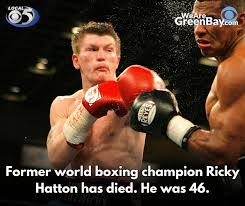
Introduction
The sports world was shaken recently with the news of the death of Ricky Hatton, the legendary British boxer. Known for his formidable fighting style and engaging personality, Hatton’s passing has left fans and fellow boxers mourning the loss of an icon. His journey in boxing and the challenges he faced in life following retirement shine a light on the darker side of fame and the struggles many athletes encounter outside the ring.
A Life in Boxing
Ricky Hatton, born on October 6, 1978, in Stockport, England, rose to fame as a two-weight world champion, winning titles in both the light welterweight and welterweight divisions. His renowned fighting spirit was complemented by his energetic persona, making him a beloved figure in British sports. Over his career, Hatton amassed an impressive record of 45 wins, 32 by knockout, solidifying his legacy as one of the greatest boxers of his generation.
Challenges After Retirement
Despite his success, life after boxing took a toll on Hatton. He struggled with mental health issues, battling depression and anxiety, which are not uncommon among retired athletes. Additionally, his weight fluctuations and subsequent battles with substance abuse made headlines, raising significant concerns over athlete care and support systems after retirement.
Recent Developments
The circumstances surrounding Hatton’s death are currently under investigation. Reports suggest that he passed away in his home due to unknown causes, but specifics have yet to be disclosed by authorities. Such news has sparked concern and outrage among fans and fellow athletes, prompting discussions about mental health awareness and the importance of maintaining support networks for retired sports figures.
Conclusion
Ricky Hatton’s passing serves as a reminder of the fragility of life, especially in the high-pressure world of professional sports. As tributes pour in from fans and athletes alike, the focus shifts not only to celebrating his incredible achievements but also advocating for better mental health resources for athletes both during and after their careers. The boxing community continues to honor his legacy, while also discussing crucial interventions needed to ensure future generations do not face similar challenges.



